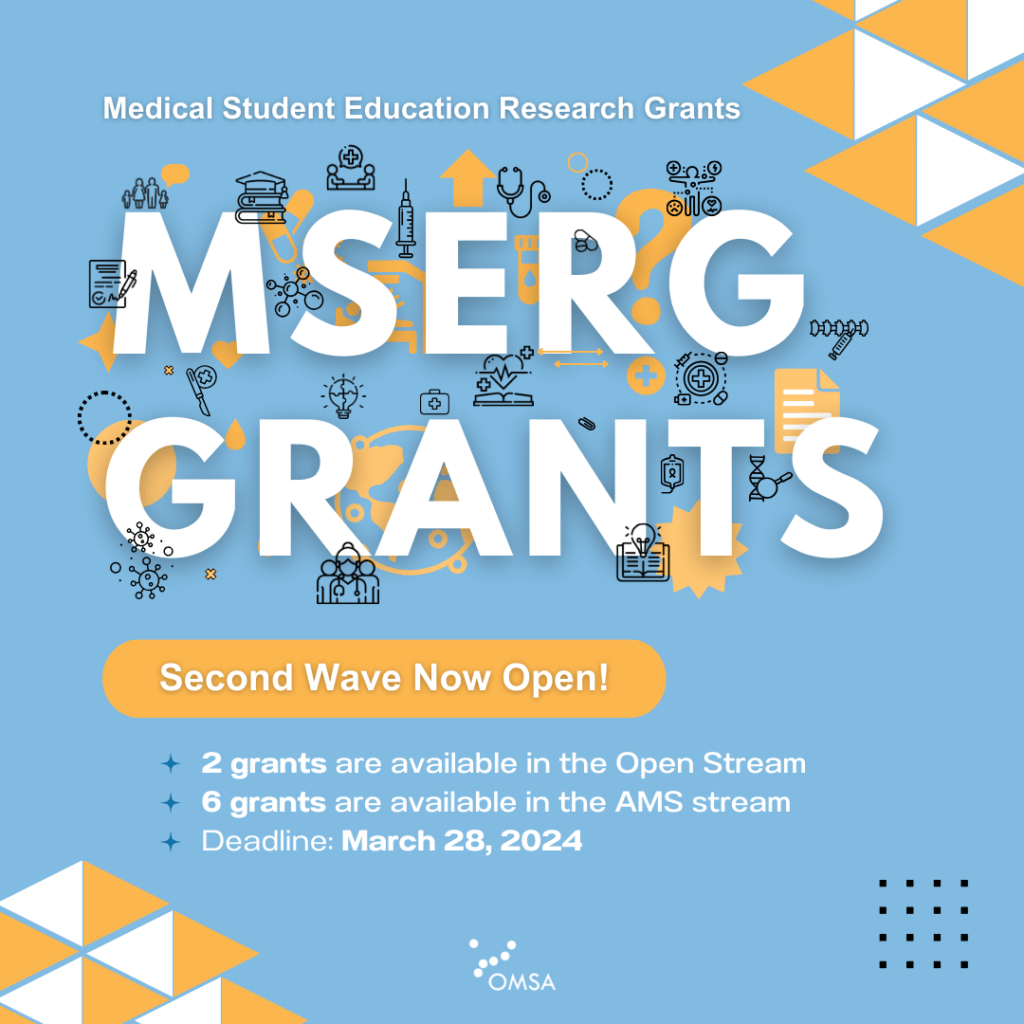The Medical Student Education Research Grant (MSERG) Awards are a unique opportunity for medical students across Ontario to be funded for their research dedicated to medical education. MSERG provides grants of $5,000 to ON medical students annually, with sponsorship from TD Bank, AMS Healthcare and OMA Insurance. Through the generous support of our sponsors, we hope to support groundbreaking medical education research that transforms the landscape of our future healthcare and medical communities.

OMSA is excited to announce the eighth annual MSERG Call for Applications. The Spring 2025 MSERG will provide 2 grants in the Open Stream and 6 grants available in the AMS Stream for projects designed by Ontario medical students. Please see the OPEN Application Info tab below for more details. The deadline to apply is March 28th, 2025. Please feel free to contact omsa.mserg@gmail.com if you have any questions.
We thank Associated Medical Services (AMS) Healthcare for their generosity in funding 6 Compassionate Care awards, TD Bank for funding 6 TD Open Awards, and OMA insurance for funding 1 Open Award.
The MSERG is a student award. The money is yours to spend at your own discretion. You do not need to use it to support your research project, although you are free to do so.
Absolutely. Although most students will choose to apply with their summer project, any project is eligible, so long as the results will be available by September.
Group applications will be accepted with a maximum of two student leads. Pleasure ensure that you list a maximum of two applicants for each application that you submit. You may list other research members under co-investigators, but the MSERG will only be awarded to the two listed applicants. The grant may be used as is seen fit by both applicants.
Yes. MSERG accepts projects in education for medical students, residents and fellows, and practicing physicians.
These projects will be evaluated on a case-by-case basis depending on impact on medical education. For example, a project surveying medical students’ opinions on opioid prescribing to determine if more education regarding this practice is required, would be eligible for MSERG.
MSERG applications are blinded to ensure judges do not look favourably upon the applications of their colleagues/friends/classmates etc. It is up to the applicant to ensure that the application is properly anonymized. However, The Director of Education will also go through all of the applications and black out any identifiers that the applicant may have missed. Please note that points may be deducted if the application has not been properly anonymized.
MSERG applications are judged based on standardized marking criteria by three members of the OMSA Education Committee. These three members are asked to excuse themselves from judging a particular application if they are familiar with the project.
We would like you as the applicant to forward all the forms and materials to us in one email. This includes your PI’s letter of support.
Absolutely.
Yes. You can send two or more applications if they are completely different projects.
Please use the application form found on this page and submit your application as the same .docx format. In addition, please use Calibri font size 11 and please do not change the margin width.
You can find more information on the past MSERG recipients and their projects in the following editions of Scrub-In:
2021 OMSA Open MSERG:
2021 OMSA/AMS Compassionate Care MSERG:
2020 OMSA Open MSERG:
2020 OMSA/AMS Compassionate Care MSERG:
2019 OMSA Open MSERG:
2019 OMSA/AMS Compassionate Care MSERG:
2018 OMSA Open MSERG
2018 OMSA/AMS Compassionate Care MSERG:
Officially founded in May 1974 during the Ontario Medical Association’s AGM, the Student Section of the OMA was started using the acronym “OMSA” (short for Ontario Medical Students Association) in 2004.
Copyright © 2024, Ontario Medical Students Association (OMSA).
The views expressed on this website do not in any way represent those of the Ontario Medical Association (OMA).